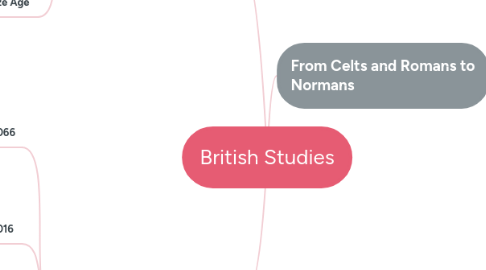
1. The Norman Invasion
1.1. 1066
1.1.1. THREE kings - TWO Battles - ONE Comet
1.1.1.1. 1st King: Edward the Confessor 2nd King: Harold Godwinson 3rd King: William I, Duke of Normandy
1.1.1.2. Two Battles: Battle of Stamford Bridge (25th Sept 1066) Battle of Hastings (14th Oct 1066)
1.2. 1016
1.2.1. THREE kings - TWO nations - ONE woman
1.2.1.1. AEthelred II dies, his son Edmund Ironside fights to succeed him. Gets defeated by Canute; kingdom divided intro two. Edmund Ironside is killed
1.3. 1014
1.3.1. King Sweyn Forkbeard dies, succeeded by son Canute, AEthelred II gets back on English throne
1.4. 1013
1.4.1. King Sweyn Forkbeard of Denmark seizes kingdom from Anglo-Saxon AEthelred II
1.5. 991
1.5.1. after Battle of Malden, AEthelred pays tribute to Danish King until 1002, orders a massacre of Danish settlers
1.6. Domesday Book (1086)
1.6.1. survey of all villages by William; documented land, ox teams, mills, fish ponds, vineyards, trade, animals and people. Purpose was to determine land value, how much could be taxed
2. Prehistoric Britain
2.1. Stone Age
2.1.1. oldes human settlements discovered Britain around 800,000 years ago. Ice Age wiped out almost all of the settlements. After last Ice Age (10,000 B.C.): better conditions for humans: fertile land and warmer temperatures
2.2. Bronze Age
2.2.1. Iberians: settled in Britain in Neolithic Period about 2,000 B.C., are connected to building of "henges"
2.2.2. Beaker people: named after their pots; arrived between 2,300 and 1,800 B.C.; individual graves, metal-working skills, hill-forts replaced henges
3. From Celts and Romans to Normans
3.1. "so-called" Celts
3.1.1. started arriving 800 B.C. from central europe, later Belgium+France; metal-working skills, better weapons successful farmers Celtic cultures had unique languages; in Britain they split into two main languages: Goidelic and Brythonic
3.2. Romans
3.2.1. Caesar made two expeditions to Britain in 55 and 54 B.C.; first in Kent but was weakened due to storm damage not enough horses to advance second Caesar forced several tribes to pay tribute and give hostages and installed local king; when Caesar left island, tribute stopped -> Caesar had not conquered any land
3.2.2. Claudius successfully invaded Britain in 43 A.D., defeated celtic tribes and managed to control southeast of mainland with Wales and North following; Romans built Hadrian's Wall as a barrier against Picts (what is Scotland today) Hadrian's Wall built of order od Emperor Hadrian, wall was 80 Roman miles (120km); many celtic tribes happily cooperated with Romans and profited from advanced culture
3.2.3. famous Roman roads: Watling Street; Fosse Way; Ermine Street
3.3. Boudicca
3.3.1. tribe of the Iceni, queen was Boudicca. Destroyed Roman town of Colchester and then London, died in battle in 61 A.D.
3.4. Anglo-Saxons
3.4.1. saxon invasion in 408 was stopped by Britons (Celts and Roman-British tribes possibly fought together), Romans didn't help; Anglo-Saxons were a conglomerate of tribes, germanic tribes speaking Germanic languages, worshipped Germanic Gods. Celts saw them as barbarians
3.4.2. Anglo-Saxon Kingdoms: Northumbria Mercia Essex East Anglia Kent Sussex Wessex
3.5. The Vikings
3.5.1. started attacking English coast in late 8th centrury; Danes and Norsemen (pirates) were also explorers, traders and simple peasants; established settlements in Britain 4 Danish and Norse kings ruled Britain from 1014 until 1042
3.5.2. Battle of Maldon

